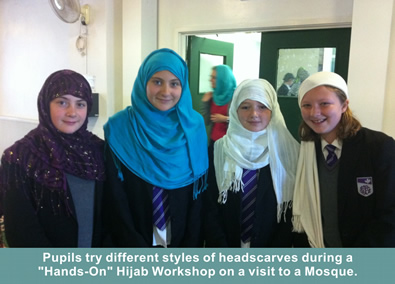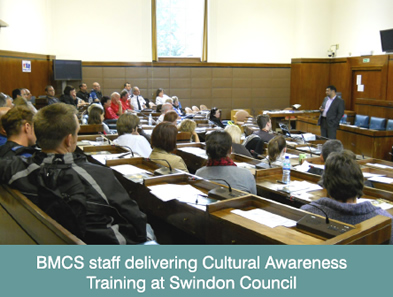Cultural Awareness
The demand for this work extends beyond Bristol and the South West where we continue to meet with communities who have had little or no personal interaction with members of the Muslim Faith and so up until this point their only understanding of Islam and Muslims has been via the Media. Being able to play such a pivotal role in bringing communities together is, and continues to be, a privilege for BMCS.
BMCS is a charity and receives no government funding. Our work is sustained only through the money we receive from delivering workshops.
The four categories of our work are:
- Early years & Primary
- Secondary
- Colleges & Higher education
- Multi-Agency Training
Working with educational institutions
We have over the years, forged excellent links with the education sector in Bristol & the South West. Our ‘Demystifying Islam’ workshops with the educational institutions is now seen as a complimentary subject to their teaching of Islam to pupils at all levels and ranges as part of their teaching of Religious Education curriculum. We are regularly contacted to advise on issues affecting Muslim pupils.

Early years & Primary
Our workshops for early years are interactive with lots of visual aids including religious artefacts and scriptures. They are based on brief descriptions of the 5 pillars of Islam. For older primary years, in addition to more detailed descriptions of the 5 pillars, we cover the 7 articles of faith. We also, demonstrate how Muslims pray, which children love to join in with (be assured that this is not an act of prayer but simply a demonstration of the actions performed and some of the phrase recited in English). We are able to tailor our workshops to meet curriculum needs and themes to offer a very bespoke service.
Secondary
We have worked with many schools at GCSE level and our work has become an invaluable aid to supporting students studying Islam as part of their GCSE Religious Studies curriculum. We deal with a range of topics from general Islam to Islam’s perspective on cloning, fertility treatment, human rights, women in Islam, equality, genetic engineering, life and death issues, issues around Muslim burial and death.
Colleges & higher education
We also work with Universities and Colleges. We work with a wide range of students from students studying Theology at degree level or those studying Islam at GCSE or A-Level.
This work also includes our presentations and workshops on Islamophobia and our work in training future teachers around Demystifying Islam who may want to understand Islam and Muslims better in their classroom teaching of Islam.
Our workshops around Islampohobia also help trainee teachers identify pupils who may be suffering from this type of racism.
Our sessions bring Islam to life with lived experience and help students or other professionals understand key concepts. Using our expert knowledge we also help students understand a wide range of ethical and social issues from an Islamic perspective.
These sessions also include Virtual Reality views of the Mosque in Mecca and the Kaaba.
What Our Students Have to Say
Multi-agency training
BMCS offers training to the public, private & voluntary sectors. We tailor the training program to the needs of the organisation after consultation. This training is offered on a half day or full day basis.
Through our high quality and interactive ‘Demystifying Islam’ programme, we have helped to train hundreds of individuals from various agencies across Bristol. We have been commissioned by the Youth Offending Team (YOT) where we helped to enable participants to not only gain a better understanding of Muslims and their faith but also equipped them with the correct knowledge to work and interact with their Muslim clients.
We work closely with our partners to ensure our presentations are interactive and relevant to the audiences attending in order to achieve maximum benefit. We continue to receive positive feedback where attendees share that their misconceptions about Islam and Muslims were removed due to our ‘Demystifying Islam’ programme and that they feel more equipped and confident to interact with Muslims in the future; which as result allows them to provide a better class of service in their jobs.

A selection of the beneficiaries of our Cultural Awareness programe:












